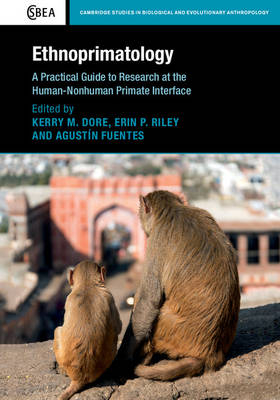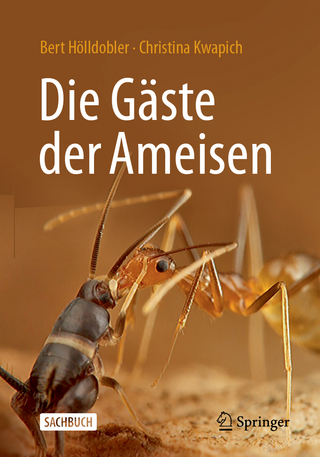
Ethnoprimatology
Cambridge University Press (Verlag)
978-1-107-10996-4 (ISBN)
Ethnoprimatology, the combining of primatological and anthropological practice and the viewing of humans and other primates as living in integrated and shared ecological and social spaces, has become an increasingly popular approach to primate studies in the twenty-first century. Offering an insight into the investigation and documentation of human-nonhuman primate relations in the Anthropocene, this book guides the reader through the preparation, design, implementation, and analysis of an ethnoprimatological research project, offering practical examples of the vast array of methods and techniques at chapter level. With contributions from the world's leading experts in the field, Ethnoprimatology critically analyses current primate conservation efforts, outlines their major research questions, theoretical bases and methods, and tackles the challenges and complexities involved in mixed-methods research. Documenting the spectrum of current research in the field, it is an ideal volume for students and researchers in ethnoprimatology, primatology, anthropology, and conservation biology.
Kerry M. Dore is a Research Associate in the Department of Anthropology at the University of Texas, San Antonio and an Adjunct Instructor at Marist College, New York and Eastern Kentucky University, Richmond. Her research focuses on the interface between vervet monkeys and people in St Kitts and the broader Caribbean. Erin P. Riley is Professor of Anthropology at San Diego State University. Her research examines the impact of anthropogenic habitat alteration on macaque ecology and behavior, and cultural conceptions of primates, nature, and conservation. Agustín Fuentes is Professor and Chair of Anthropology at the University of Notre Dame, Indiana. His research focuses on cooperation and community in human evolution, ethnoprimatology and multispecies anthropology, evolutionary theory, and interdisciplinary approaches to human nature(s).
1. Introduction: doing ethnoprimatology in the Anthropocene Erin P. Riley, Agustin Fuentes and Kerry M. Dore; Part I. Characterizing the Interface: 2. Introduction to Part I Tracie Mckinney; Section 1. Behavioral Ecology: 3. Habituation to tourists: protective or harmful? Jessica L. Westin; 4. Assessing the role of exotic and ornamental plants in the ecology of gray mouse lemurs (Microcebus murinus) in southeastern Madagascar Krista Fish; 5. The looming legacy of deforestation for red colobus monkeys in Kibale National Park Krista M. Milich; 6. Food, feeding and foraging: using stable isotope analysis as a methodology in the study of urban primate dietary patterns Anne Kwiatt; 7. Measuring movement: how remote telemetry facilitates our understanding the human-macaque interface Amy R. Klegarth; Section 2. Epidemiological Studies: 8. An ethnoprimatological assessment of human impact on the parasite ecology of silky sifaka (Propithecus candidus) James E. Loudon, Erik R. Patel, Charles Faulkner, Robert Schopler, Rachel A. Kramer, Cathy V. Williams and James P. Herrera; 9. Characterizing simian foamy virus transmission in Bangladesh Lisa Jones-Engel; Section 3. Predator-Prey Studies: 10. How do Pagai, Mentawai Island (Sumatra, Indonesia) nonhuman primate characteristics affect hunters' prey selection? Lisa M. Paciulli and Kristin Sabbi; Section 4. Human-Primate Conflict: 11. Flexibility in Javan gibbon (Hylobates moloch) response to human disturbance Melissa A. Reisland and Joanna E. Lambert; 12. Conflicted primatologists: a survey on primatologists' views on conflict and resolution between human and nonhuman primates Mary Baker, Paula Pebsworth and Sindhu Radhakrishna; Part II. Following the Data: Incorporating Ethnography: 13. Introduction to Part II John Knight; 14. Incorporating the ethnographic perspective: the value, process, and responsibility of working with human participants Nicholas Malone, Ally Palmer and Alison Wade; 15. Nonhuman primates and 'others' in the Dzanga Sangha reserve: the role of anthropology and multispecies approaches in ethnoprimatology Melissa J. Remis and Carolyn A. Jost Robinson; 16. Sacred monkeys?: an ethnographic perspective on Macaque sacredness in Balinese Hinduism Jeffrey Peterson and Erin P. Riley; 17. Navigating the methodological landscape: ethnographic data expose the nuances of 'the monkey problem' in St Kitts, West Indies Kerry M. Dore; 18. An ethnoprimatological approach to assessing the sustainability of primate subsistence hunting of indigenous Waiwai in the Konashen Community Owned Conservation Concession, Guyana Christopher A. Shaffer, Elisha Marawanaru and Charakura Yukuma; Part III. Implications for Conservation: 19. Introduction to Part III Carolyn A. Jost Robinson; 20. Using a mixed-methods approach to elucidate the conservation implications of the human-primate interface in Fanjingshan National Nature Reserve, China Amanda Ellwanger, Erin P. Riley and Chia Tan; 21. Culture, conflict and conservation: living with primates in northeastern India Sindhu Radhakrishna; 22. The conservation implications of seasonal endangered lemur hunting Cortni Borgerson; 23. Ethnoprimatology matters: integration, innovation and intellectual generosity Agustin Fuentes, Erin P. Riley and Kerry M. Dore; Index.
| Erscheint lt. Verlag | 23.2.2017 |
|---|---|
| Reihe/Serie | Cambridge Studies in Biological and Evolutionary Anthropology |
| Zusatzinfo | 38 Tables, black and white; 40 Halftones, black and white |
| Verlagsort | Cambridge |
| Sprache | englisch |
| Maße | 180 x 253 mm |
| Gewicht | 800 g |
| Themenwelt | Naturwissenschaften ► Biologie ► Humanbiologie |
| Naturwissenschaften ► Biologie ► Zoologie | |
| Sozialwissenschaften ► Soziologie | |
| ISBN-10 | 1-107-10996-5 / 1107109965 |
| ISBN-13 | 978-1-107-10996-4 / 9781107109964 |
| Zustand | Neuware |
| Haben Sie eine Frage zum Produkt? |
aus dem Bereich


